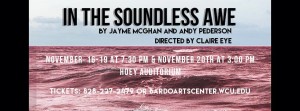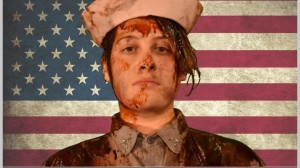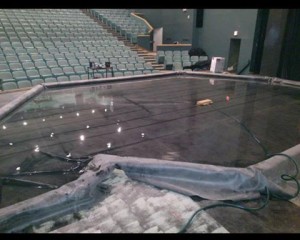After years of being haunted by the past, there’s only so much any man can take. Guilt can take its toll. Western Carolina University’s School of Stage and Screen presents “In the Soundless Awe,” a historical genre play co-written by Jayme McGhan, associate professor and director of the school.

Official graphic for the show. From WCU Stage & Screen Facebook page.
The production, part of WCU’s Mainstage theater season, will be staged at Hoey Auditorium at 7:30 p.m. Wednesday, Nov. 16, through Saturday, Nov. 19, and at 3 p.m. Sunday, Nov. 20.
The play explores the emotions of soldiers who survived one of the worst naval disasters in U.S. history. On July 30, 1945, during the height of WWII’s Pacific Theater, the USS Indianapolis was sunk by two Japanese torpedoes after delivering parts for the first atomic bomb. There were 1196 sailors on board; only 317 survived after four days fighting exposure, dehydration, saltwater poisoning and shark attacks. We join the captain of that fateful ship, the wrongly court-martialed Charles Butler McVay lll (Silas Waugh), twenty-two years later pointing a gun to his head as he grapples with his nightmares of those nights and the burdens of his decisions.
Before joining the WCU faculty in 2015, McGhan wrote “In the Soundless Awe” with fellow writer Andy Pederson, who were both associate professors at Concordia University of Chicago.
The action of the play takes place in a basin of water built on stage. According to Jayme McGhan, they constructed a shallow pool of water (roughly 1 to 2 inches deep) out of thick rubber membrane. For protective measures, there is a safety pool underneath the main pool to serve as a catch in case of failure.

Promo shoot for “In The Soundless Awe”. Taken from official Stage & Screen page. Photo of Libby Rounds, actor.
According to one of the make-up artists of the show, Arianna Evans, it’s a messy and challenging play. Latex is used for tricky designs, but some of the cast is allergic to it, so other special effects must be used effectively. To showcase the carnage, students are creepily dolled up with acrylic paint, covered in a goop of colored chocolate syrup and molasses, and even some have plastic wrap to help keep gore designs consistent. The difficulty is not having designs wash off and stain the water in the pool.

Pool built for show. Taken from Stage & Screen at WCU.
While the pool is filled with warm water, standing in the water for long periods of time according to student actor, Ian Scott, is where the show gets difficult. After being in the pool for a while, their clothes are soaked and standing up for long periods of time in open air is where the actors start to freeze. There are space heaters with crew members monitoring them backstage to ensure that actors both stay warm and no fires start. Evans says that the crew’s number one concern is that the actors stay safe.
“This show is demanding in all regards: physically, mentally and emotionally. I know at the end of every show I’m likely to be bawling my eyes out,” Scott commented. He did encourage people to come because of the message it caries.
“If you want to see our true capabilities, technically and acting wise, this is one of the most challenging and intense shows to see. It’s emotionally charged, and very serious,” asserted Evans.
All retired and active duty members of the military will receive free admission to the production in honor of their service. Those individuals should mention their service to the box office staff to receive a complimentary ticket.
In light of the show’s commentary, many students have taken it upon themselves to bring awareness to post-traumatic stress disorder. Facebook posts have been buzzing with WCU social circles with friends nominating others for the 22 push up challenge. The 22KILL movement started in 2013 – under Honor Courage Commitment, Inc., another nonprofit organization focusing on veteran entrepreneurship – after the VA released the staggering statistic that an average of 22 veterans are killed by suicide every day. People have been recording themselves doing 22 push ups for 22 days, nominating 22 friends as they go. Students at Western have used this campaign as a way to bring awareness to PTSD and to advertise for the upcoming play, “In The Soundless Awe”.
“I absolutely hope this challenges how people think about soldiers. I think PTSD doesn’t have as many foundations as other afflictions. I think this show does a really good job with how it shows Charles McVay later on in his life that this is all he sees day in, day out,” said Scott. “It’s terrible.”
“Please be advised that the play does include intense scenes of carnage and sounds and imagery that may trigger those suffering from post-traumatic stress disorder,” McGhan warned in the Reporter.
Tickets for “In the Soundless Awe” are $11 for WCU faculty and staff, and seniors; $16 for adults; and $10 for students on the day of the show and $7 in advance. Tickets can be purchased from the John W. Bardo Fine and Performing Arts Center or their website or calling 828-227-2479.


